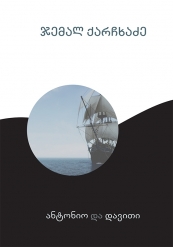ANTONIO AND DAVID
The book by the Italian traveler and merchant Bartolomeo d’Aniti, written after travelling around many countries, tells us a thousand stories, customs and habits of various peoples. These events were personally experienced, some are funny, some serious, but the amazing drama of Antonio and David is shocking and makes many people think things that had never entered their minds before. This story takes place in a country known at the time as Colchis. The Argonauts once invaded this country for the Golden Fleece; today it is part of Georgia. It was here that the Italian royal court sent Bartolomeo, the narrator of this story, together with a missionary delegation, to study the possibilities for trade with Colchis. Bartolomeo makes friends with a missionary in the delegation, Antonio by name, who was once in confrontation with the Church, on account of which he had been sentenced by the Holy Inquisition to be burned at the stake. Antonio was pardoned as a result of the intervention of influential relatives and friends, but several of his friends and accomplices were burned, so that Antonio felt his pardon to be a heavy burden on his conscience throughout his life. While in Colchis, Bartolomeo and Antonio had to visit the local mountains to look for copper deposits. In the village where they were housed they noticed that people were living with a strange fear. After a short while the reason became clear, and the local inhabitants told them the story. This novel is written in the first person by Bartolomeo d’Aniti, and such an ‘outside view’ of Georgia makes this book readily comprehensible to the foreign reader. The text of Antonio and David is one of those rare cases where a tense narrative and a powerful intellectual stream are harmoniously combined. Thanks to its faultless language and a writing technique of the very highest level, the text is easily grasped by any reader interested in the story, while at the same time it offers vast aesthetic and cognitive material for literary connoisseurs. Antonio and David is a most important work by Jemal Karchkhadze and one of those rare texts that stand the test of time.
‘Great writers are identified above all else by their phrasing. Jemal Karchkhadze’s phrasing is astonishing.’
L. Bregadze, literary critic
‘In his prose Jemal Karchkhadze shows us that a human being has the capacity to realise an inner truth based on achieving the highest human concept: freedom.’
M. Beriashvili, philosopher
EXTRACT
Translated into English by PJ Hillery
Excerpt from the book “Tales, Customs and Morals, being a description of the lands in which, with the help of God, the traveller and merchant Bartolomeo d’Aniti journeyed peacefully, narrated in detail and without embellishment by the aforementioned d’Aniti”.
EXTRACT
Translated into German by Sergo Okropiridze
Ein Ausschnitt aus dem Buch "Die Geschickten und Sitten oder die Beschreibung eines Landes, welches der Handelsreisende Bartholomeo d'Anitti friedlich durchwanderte", erzählt vom erwähnten d'Anitti ausführlich und ungeschminkt.
Wie ich gleich am Anfang des Buches erwähnte, bin ich einen grossen Teil meines Lebens gewandert und habe dabei viele Länder gesehen, manche nach meinem eigenen Wunsch, andere aber im Auftrag des Hofes. Ich hatte das Reisen dermassen liebgewonnen, dass ich zu Hause kaum länger als ein paar Tage bleiben konnte. Zwar überfiel mich in der Fremde nicht selten schwere Melancholie und Heimweh, aber sobald ich heimgekehrt war, zog mein Herz mich wieder nach den unbekannten, nie gesehenen Ländern. Wo ich mich dann auch befand, ich lernte nach Möglichkeit die Sprache des Volkes. Anfangs liess ich sie mir von den Einheimischen beibringen. Nachher aber, als ich merkte, dass die Fremdsprachen mir leichtfielen, versuchte ich sie noch vor der Abreise daheim zu lernen. Jedem, der das Reisen liebt, empfehle ich es, weil die Sprachkenntnis es dem Reisenden um vieles erleichtert. Vor allem geht viel Zeit durch das Dolmetschen verloren. Ausserdem gewinnt man einen Fremden viel eher, wenn man ihn in seiner Sprache anredet. Auf diese Weise hat man schnell sein Vertrauen gewonnen, und er schüttet einem eher sein Herz aus. Das merkte ich überall. Die Natur des Menschen scheint nun einmal so eschaffen zu sein. (See PDF)
In case of using the information, please, indicate the source.
